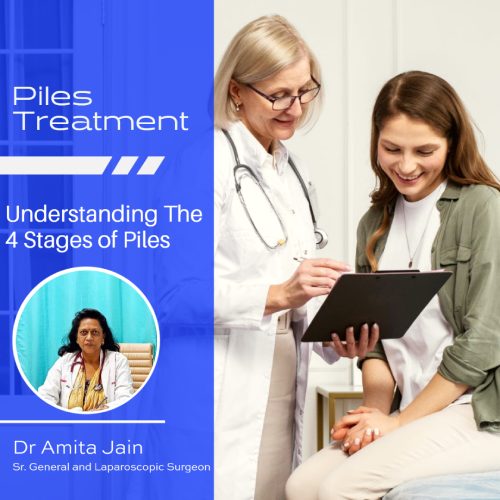Explains Delhi’s Top Laparoscopic Surgeon for Piles, Dr Amita Jain
When a hemorrhoid forms it is known as piles. Piles or haemorrhoids are swollen veins. This form of swelling can lead to localized inflammation of the other tissues, leading to extreme discomfort.
Talking about the types of haemorrhoids, there are internal and external haemorrhoids. An internal haemorrhoid takes form when the veins within swell up. They can arise due to various reasons. External piles form small lumps on the affected part’s outside edge. They are extremely itchy. They can even be painful upon the formation of a blood clot.
Dr Amita Jain, one of the best piles surgeons in Delhi in the field of laparoscopic surgery talks about the 4 stages of piles.
Stage 1: First-degree haemorrhoids
In this stage, the haemorrhoids are internal and generally not visible. They might cause minimal symptoms, like mild itching or discomfort, but typically do not cause pain. They might occasionally bleed during bowel movements.
Stage 2: Second-degree haemorrhoids
At this stage, the haemorrhoids become larger and might prolapse (protrude) during bowel movements, but retract back into the affected part on their own. They may cause more significant symptoms, including itching, pain, and bleeding. However, the symptoms generally resolve after the prolapsed haemorrhoids reduce.
Stage 3: Third-degree haemorrhoids
Third-degree haemorrhoids are larger and more prolapsed compared to second-degree haemorrhoids. They typically need manual repositioning, meaning they do not retract back into the on their own. Symptoms are more pronounced and might include bleeding, itching, pain, and discomfort.
Stage 4: Fourth-degree haemorrhoids
This is the most severe stage of haemorrhoids. Fourth-degree haemorrhoids are permanently prolapsed and are not manually repositioned. They might cause significant pain, bleeding, itching, and discomfort. In certain cases, a blood clot (thrombosis) can develop within the prolapsed haemorrhoids, leading to extreme pain and swelling.
It is essential to note that the symptoms and severity of haemorrhoids may vary from person to person. If you doubt you have haemorrhoids, it’s advisable to consult a doctor like Dr Amita Jain, for the right diagnosis and appropriate treatment.

Dr Amita Jain is one of India’s most distinguished and experienced senior surgeons who has conducted more than 1,00,000 successful surgeries, and has covered a wide spectrum of general and minimally invasive procedures. Dr Amita Jain is refered as the pioneer surgeon in the fields of Gallbladder stone removal surgery, appendix removal surgery, hernia repair surgery, Pilonidal Sinus treatments, varicose vein and piles surgery, fistula surgery and fissure surgeries.
With an outstanding career spanning over 29 years, Dr Amita Jain has earned her place among the top General and Laparoscopic surgeons in Delhi and India, known for her precision, compassion, and consistent surgical excellence. She was the Professor of Surgery at the Army College of Medical Sciences and Base Hospital, Delhi Cantt. In 1994, she was commissioned as a surgeon under the United Nations Mission in Congo.
Dr Amita Jain currently serves as the Head of Department and Senior Consultant for General, Laparoscopic and Trauma Surgery at Artemis Lite Hospital, Rosewalk – Luxury Maternity Hospital in Delhi (Panchsheel Park, Delhi) and Rainbow Children Hospitals (Malviya Nagar, Delhi).
